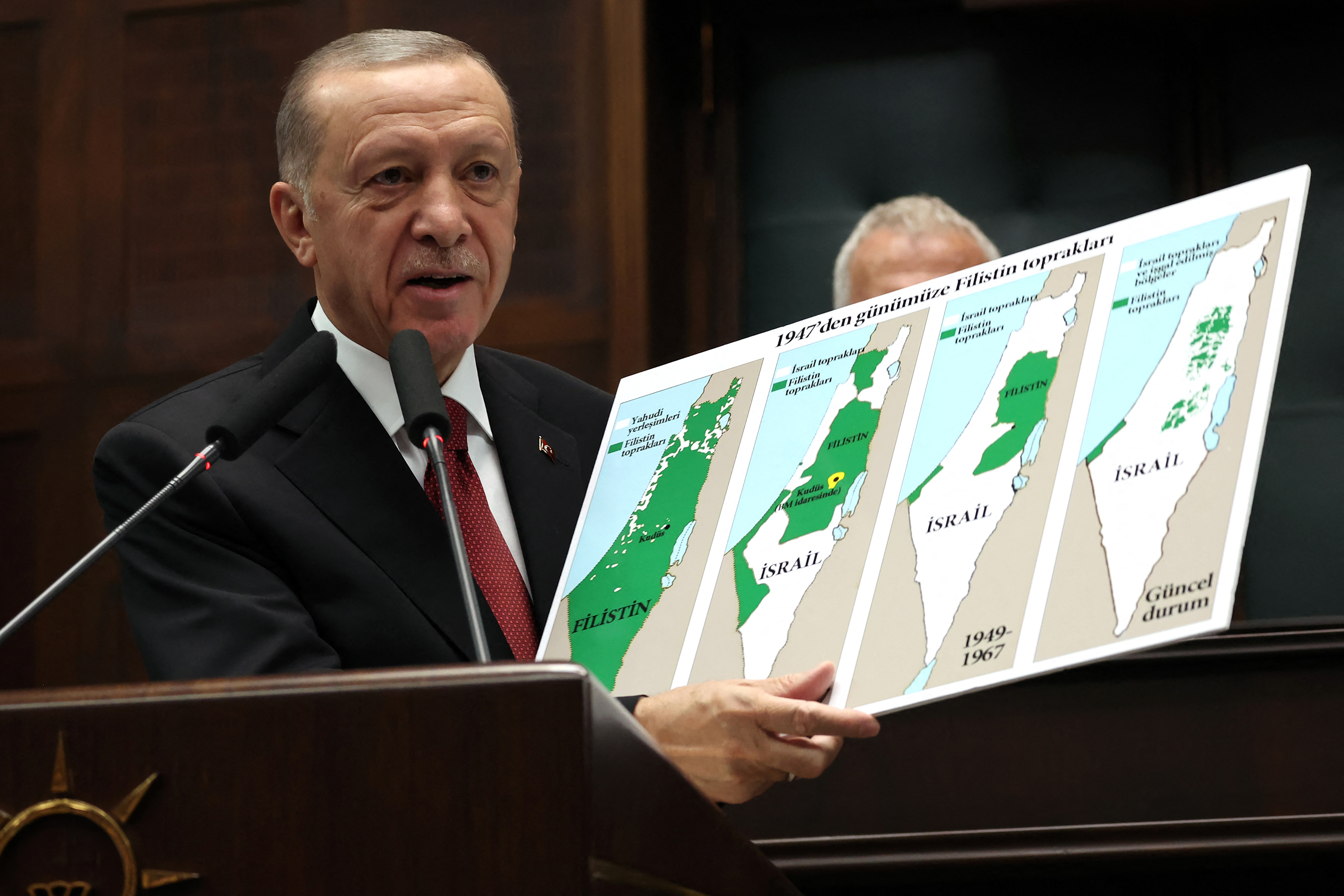As tensions rise in and around Gaza, and with Israel pounding the Hamas stronghold as it prepares for a potential ground invasion, regional powers are focused on saving civilian lives and achieving a ceasefire.
Egypt, with its land border, and Qatar, a long-time Hamas ally, have been viewed as the most likely intermediaries in a conflict that risks spiraling out of control. But Turkey is another contender that cannot be ignored.
Since the attacks, Turkish President Recep Tayyip Erdogan, a staunch supporter of Hamas, has reserved his fiercest criticism for the United States. He continues to advocate for an independent Palestinian state with East Jerusalem as its capital within the 1967 borders and has warned that US military maneuvers in the region could lead to “serious massacres” in Gaza.
Foreign leaders have in turn called on Ankara to intervene. German Foreign Minister Annalena Baerbock urged Turkey to use its diplomatic ties with Hamas to push for the release of hostages, including German nationals. In response, Baerbock’s Turkish counterpart, Hakan Fidan, unveiled a Turkish peace plan.
But is the West asking more of Turkey than it can deliver? Desperate for a solution, the international community seems ready to take help wherever it may come. Yet there are two reasons why that place is unlikely to be Ankara.
The first is simply that Ankara’s relationship with Hamas, although possibly useful in this situation, is too cozy for many world leaders to accept.
The second is more complicated, and involves Turkey’s war against the Kurdish-dominated Syrian Democratic Forces (SDF) in northern Syria.
Unlike many countries in the West, Turkey hasn’t designated Hamas a terrorist organization. On the contrary, Ankara has deepened ties with the group over the last decade. In 2012 and with Turkey’s blessing, Hamas opened an office in Istanbul. With the civil war in Syria developing, then-Foreign Minister Ahmet Davutoglu viewed closer ties with Hamas as a way to maintain influence in the region.
This caused concern in Israel, where relations with Ankara had plunged after the Gaza flotilla raid in May 2010. During that altercation, an Israeli military operation against the Turkish ship Mavi Marmara, which was seeking to deliver humanitarian aid to Gaza, killed nine activists and injured 10 Israeli commandos.
Relations were strained further in December 2021 when the Jerusalem Center for Public Affairs published a report, citing Israeli intelligence, that accused Hamas of planning and directing hundreds of terror attacks against Israelis from its Istanbul headquarters.
But rather than dial back its Hamas ties, the Erdogan administration doubled down, even granting citizenship to senior Hamas leaders and operatives. Sinan Ciddi, a Turkey expert at the Foundation for Defense of Democracies, in Washington notes that Erdogan “maintains warm ties with top Hamas officials,” including senior political leader Ismail Haniyeh and commander Saleh Al Arouri, “two of the likely masterminds behind the recent attacks.”
The Hamas attack is expected to derail signs that relations between Turkey and Israel were starting to improve after they restored full diplomatic ties in August last year.
It’s no surprise that leaders in the US and Israel are now calling for Turkey to clarify its relationship with Hamas, close the group’s offices in Turkey, and revoke Turkish passports of its leaders. Thus, the question for Erdogan is whether he wants to be a negotiator, or a facilitator.
The second barrier – Turkey’s relations with the Kurds and the SDF – is even more insurmountable.
As Turkey has maintained ties to militant Hamas, it has gone on the offensive against the People’s Defense Units (YPG) in Syria, the mainly-Kurdish militant groups that make up the Western-backed SDF. Erdogan has labeled the YPG terrorists because of their connection to the Kurdistan Workers’ Party (PKK), which maintains an armed guerrilla movement inside Turkey.
After a recent strike against the SDF, a Turkish drone attack near a US base in northeast Syria, US President Joe Biden signed an executive order extending the US military presence in the area.
Turkey’s struggle with the PKK – and by association, the YPG/SDF – has also created geopolitical headaches in Europe. Erdogan has accused Sweden, an aspiring member of NATO, of harboring PKK fighters. In retaliation, he’s held up Sweden’s NATO membership bid.
Washington views Turkey’s actions, and Erdogan’s anti-American rhetoric, as moves designed to chase the US from Syrian soil. This likely explains why Turkey wasn’t among the many countries Secretary of State Antony Blinken visited during his recent tour in the Middle East, and why trust between the two allies is at an all-time low.
In such a venomous climate, President Biden, who arrived in Israel this week, is unlikely to turn to Erdogan in this time of need. Despite Ankara’s aspirations, it is Egypt and Qatar that will be at the table as Washington seeks an exit from the quagmire in Gaza.
Yavuz Baydar is a senior journalist and analyst in Turkish and international media. He was formerly the editor-in-chief of Ahval News and served as Turkey’s first independent news ombudsman between 1999-2013.

